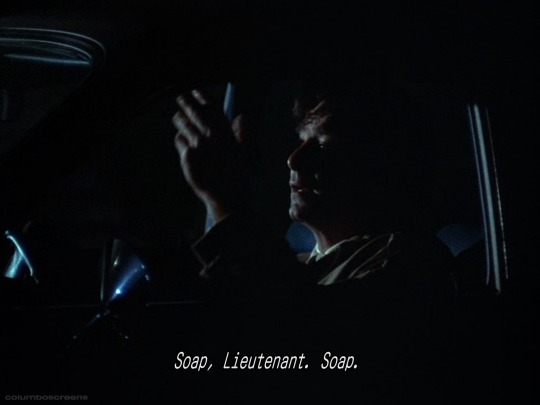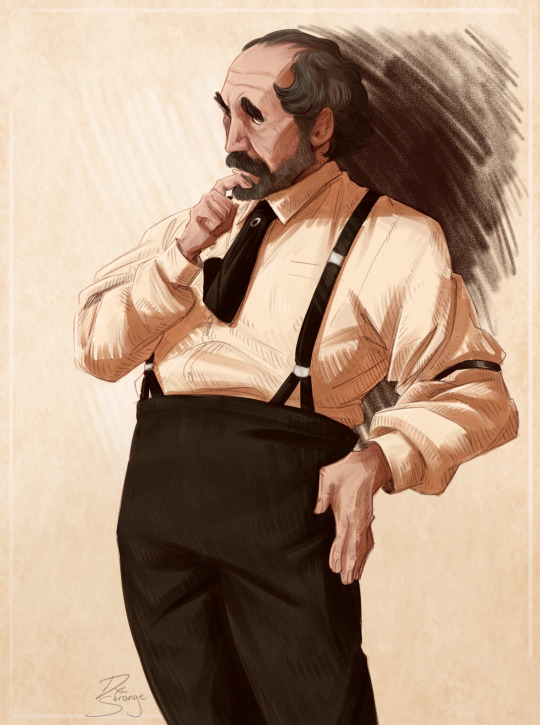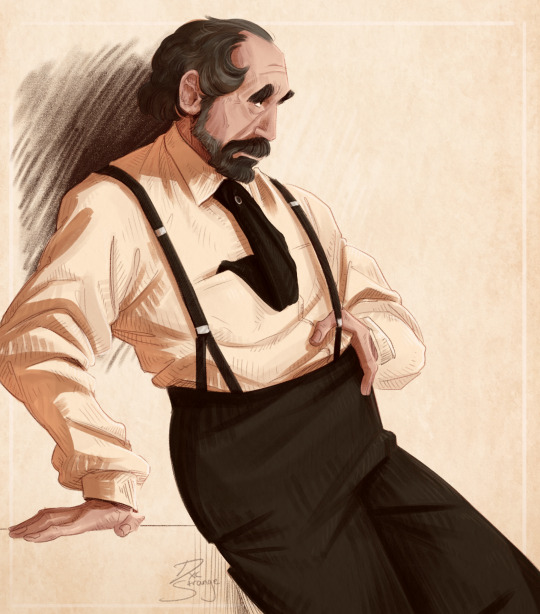#ignaz semmelweis
Text

"We are doctors of the modern age. We are marching into battle."
-
I was lucky enough to be able to see "Dr Semmelweis" last month and it genuinely was the most breathtaking, compelling, gripping and stunning play I have ever seen. From acting to lighting, set design and script. It was just perfect and I will NEVER forget about it 💖
#so prepare yourself for fuckloads of Semmelweis artworks in the future#mark rylance#dr semmelweis#ignaz semmelweis#dr semmelweis play#dr semmelweis west end#theatre play#theatre#my art#artwork#digital art#artists on tumblr#illustration#drawing#fanart#artist#character art
39 notes
·
View notes
Text
Washing before a procedure is a relatively new practice, but George instilled the importance of it when I was little. It used to be that doctors went right from autopsies to childbirths without so much as a scrub. These days, new mothers don’t die nearly as much.
Me, an intellectual (and Hungarian): George is a fan of IGNAZ SEMMELWEIS!!
#the spirit bares its teeth#andrew joseph white#ignaz semmelweis#i love it when a piece of my country's history shows up in literature
21 notes
·
View notes
Video
😕🙉
#video#tiktok#tiktoks#history#wtf#onesimus#benjamin franklin#ignaz semmelweis#carl flügge#al gore#amber ruffin#theamberruffinshow
82 notes
·
View notes
Text
I Wash My Hands of This!
The story of Ignaz Semmeweis, as told through his fictitious diary after he'd already been committed to a mental institution. What should be a gripping medical thriller is actually just two hours of arguing about washing one's hands before surgery.
#bad idea#movie pitch#pitch and moan#sanitation#sanitization#hand washing#surgery#ignaz semmelweis#semmelweis#drama#medical drama#doctor#medicine#puerperal fever#obstetrics and gynecology#obstetrician
2 notes
·
View notes
Text
To Ignaz Semmelweis
Currently watching videos from the NIH clinical research course online and I’m two videos in when I realized no one’s going to notice you’re doing something great in the moment. They’ll usually dismiss you and gaslight you. But if you’re passionate about something and you think it might make a difference, go for it. Because if it does eventually make a difference, it’ll be good for the world. They might not notice it until you die and you might go crazy because everyone thinks you’re ridiculous but at least someone’s benefiting in the future. So, thank you Ignaz Semmelweis. You did not deserve to be fired for proving sterile conditions decrease mortality in pregnancy/delivery.
10 notes
·
View notes
Text
youtube
wash your hands kids.
And please vote for Quirks and Foibles in the Funny Women Awards 👇
1 note
·
View note
Text
Antisepsia y asepsia en el parto.
Antisepsia y asepsia en el parto.
Ignaz Semmelweis, hace más de dos siglos, se dio cuenta de la importancia de las normas de antisepsia y asepsia, en la atención del parto.
Recuerdo un letrero a la entrada de la sala de partos de mi querido Hospital Universitario de Los Andes en Mérida, Venezuela.
“QUIEN ATIENDE UN PARTO SIN NORMAS DE ANTISEPSIA Y ASEPSIA, NO SE DEBE LLAMAR IGNORANTE, SE DEBERÍA LLAMAR CRIMINAL” Ignaz…

View On WordPress
0 notes
Text
Who was Ignaz Semmelweis?
Ignaz Semmelweis Biography and about his education and discovery. Ignaz Semmelweis’s Story and his contribution to microbiology, hand washing technique.
For more info visit : Guidebooktoilife.Com
1 note
·
View note
Text

#columbo#season 3#a friend in deed#the ghost of ignaz semmelweis communing with columbo to give him the missing piece of the handwashing puzzle
58 notes
·
View notes
Text


Some more Semmelweis cos I REALLY love how he looks in that outfit with his tie tucked into his shirt pocket.....so pretty 🥺
#mark rylance#dr semmelweis#ignaz semmelweis#dr semmelweis west end#dr semmelweis play#theatre#theatre play#my art#artwork#digital art#artists on tumblr#illustration#drawing#fanart#artist#character art
23 notes
·
View notes
Text
I finally have time to talk about Lone Trail. I will be focusing on its depiction of science, technology and its progress. Will get a bit political, but funnily enough less than I imagined.
The thing that called my attention most in Lone Trail were the discussions on the nature of scientific progress. This is a theme that’s dear to me and the stuff I research about. It’s easy to think of scientific progress like an inevitable march forward, like an escalator. After all, we are much richer than we were before, right? Go to OurWorldInData dot org to play around with economic statistics in time – make sure to check the World GDP chart, from year 0 to 2000 and see it taking off like a rocket from year 1700.
What kind of Uncle Ted fan or neoluddite would go against that? Haha…hah…
Truth is that, although its effects are there, it’s not a clear if this is the little, neat process techbros want us to believe. It’s new and produces more, therefore it’s good, right? I could be writing this as a new wave of AI-generated NFTs pollute my algorithm.
That’s what makes the storytelling in Arknights so effective: it mashes together fantasy and sci-fi to really tell stories on the role of beliefs, technology, science and religion. The Rhine Lab saga is definitely an exploration of technology, with focus on the equivalent of the United States. During the period before the First World War, 1870-1913 (which is the one that Arknights draws most from), the world underwent through the so-called Second Industrial Revolution and I’ve read economic historians considering it the most innovative period in human history. I mean, obviously, there is an absolute number of inventions in our current age, but in relative terms 1870-1913 experienced a much larger number relative to the previous one.
The escalator narrative constructs scientific achievements as work of daring people (mostly men, but there were women like Marie Cuire), that combined science and technology to help mankind, like Prometheus giving mankind fire from the gods (in fact, one of these books is even named “Prometheus Unbound”); more than often they have to fight against the establishment. Remember Ignaz von Semmelweis? He just wanted doctors to wash their hands. Even I learned this standard narrative in the university. But that’s not the entire story.
The positivistic paradigm – of a science free of value judgements, made with the power of math – has actually helped build this escalator narrative. In reality, some scientists and scholars are horrible people. Later, I learned that Semmelweis, as much as he campaigned for the right thing, was a very arrogant person, who abused everyone around him, to the point few people went to his funeral.
Narratives focusing on one single hero are easy to sell and the ones building them are always on the lookout. Remember how ten years ago, a lot of people tried to push the narrative Elon Musk was going to create a new industrial revolution? Nowadays he’s just an arrogant loser who keeps dragging on his midlife crisis. The 1880s also had similar people like that, such as Thomas Edison.
Kristen Wright is definitely better than them both, because she is actually an engineering genius. But she’s also just like them, in the sense of unethical experiments, collusion with the military-industrial complex and being an overall superficially charismatic, but rotten to the core person. And she’s surrounded by a lot of people like Parvis and Ferdinand.
Breaking this line of reason, I have to say how much I hate Nietzsche’s ubermensch and master-slave morality, I hate Great Men theory, I hate Ayn Rand; these people are sheep who think themselves wolves. And before you say that Nietzsche didn’t consider himself an ubermensch, well, neither did Parvis and his reasoning was the same. For every person fancying themselves ubermensch, there’s a lot of those whom he’d call untermensch to clean up their messes. You have no idea of how times I stumbled upon people (especially libertarians) that advocate lower barriers to regulations that were written in blood, so that progress can happen quicker. Creative destruction works, as long as some people get “creative” and others clean the “destruction”. Deaths and injuries? Acceptable, just give them a pension (but fight tooth and nail in the court to not do it beyond the barest of the bare minimum, because it’ll lower the shareholder profit in 0.01%). Increase in inequality? Nobody will care in a few years, it’ll make everything cheaper anyway (look up Baumol’s cost disease to see how wrong that statement is, without being incorrect). I’m not exaggerating, sometimes the people saying that don’t even bother lacing it in politically correct language.
Because Lone Trail showed it “worked” – Kristen Wright broke off the ceiling over Terra and that will have consequences (especially with Endfield coming closer). The data from her experiments will advance science, the sight of a broken ceiling will inspire artists and prompt politicians to act. Was it worth it? Well, it will depend on who you ask (like, Ifrit or Rosmontis would have strong feelings), but it’s just there now. Serious history isn’t kind on this question as well – many technologies have a lot of transgressions, both legal and ethical, in their supply chain (both the American and Soviet space program come to my mind – guess who helped them); the difference between an entrepreneur and a criminal are contextual, because both are finding new opportunities of profit and both interlock frequently.
In the end, anyone can put an equation that has its uses, not mattering if it’s a good person or not. But that is no excuse to find good ethical practices. Silence saw everything with her own eyes and I’m really glad she’s leading the initiative for a more ethical science in Columbia – especially because people who are willing to break moral rules tend also to be willing to break research rules (this is why the “research” made in concentration camps is actually useless, it didn’t respect experimental rules). So I’m really glad for the Arknights writers for understanding these nuances and communicating them to the audience through one of the best stories of the game.
55 notes
·
View notes
Text
Physicians have a history of antagonism to the idea that they themselves might present a health risk to their patients. Famously, when Hungarian physician Ignaz Semmelweis originally proposed handwashing as a measure to reduce purpureal fever, he was met with ridicule and ostracized from the profession.
Physicians were also historically reluctant to adopt new practices to protect not only patients but also physicians themselves against infection in the midst of the AIDS epidemic. In 1985, the CDC presented its guidance on workplace transmission, instructing physicians to provide care, “regardless of whether HCWs [health care workers] or patients are known to be infected with HTLV-III/LAV [human T-lymphotropic virus type III/lymphadenopathy-associated virus] or HBV [hepatitis B virus].” These CDC guidelines offered universal precautions, common-sense, nonstigmatizing, standardized methods to reduce infection. Yet, some physicians bristled at the idea that they need to take simple, universal public health steps to prevent transmission, even in cases in which infectivity is unknown, and instead advocated for a medicalized approach: testing or masking only in cases when a patient is known to be infected. Such an individualized medicalized approach fails to meet the public health needs of the moment.
[...]
Masking as a disability accommodation in health care settings should be recognized as part of physicians’ ethical obligations. Access to health care is a particularly fraught issue, as people with disabilities often require more frequent and specialized health care than nondisabled individuals. Physicians have an ethical responsibility to promote the well-being of their patients and do no harm. Wearing a mask on a disabled patient’s request to protect them from contracting COVID-19, which could be deadly for that patient, squarely fits within physicians’ ethical obligation to provide for patients’ care and to ensure their ability to safely partake in health care settings.
92 notes
·
View notes
Text
so... apparently I've been writing Sammelweis' name wrong the entire time. It's Semmelweis, just like the doctor Ignaz Semmelweis.
I do wonder if she's going to have a heavy-handed reference to the real-life Semmelweis. Look him up, his story and role in the founding of antisepsis practices is incredibly interesting if you're into medical history like me.

#reverse 1999#semmelweis#certified storm moments#she's an npc in the rougelike mode that's introduced in the uh... 1.5 patch I think? or is it 1.6 i can't quite remember#i was curious on what her fullbody looked like and i thankfully found this on danbooru#why is your waist so tiny tho. maam your belt is crushing your organs! let your abdomen breathe jfc#you may not know this about me but i really love looking up medical history and pathology. its a really fascinating topic to me#modern medicine is such a miracle and i am intrigued on how things lead to the medicine and practices we currently have. how did#people back in the day deal with certain diseases and what was the misconceptions and what they got right but didn't quite know#the explanation of#jesus the tags turned into an essay of why i like this
40 notes
·
View notes
Text
Dracula Daily: So What About The Asylum?
So, I’ve seen a lot of posts that treat Lucy’s bubbly letter to Mina as containing a jarring tonal shift in describing the clever doctor who has “an immense lunatic asylum all under his own care.” But Lucy is not that clueless. It’s complicated! Which makes it more interesting! I’m not about to become a Victorian asylum apologist here. But I think that the novel makes more sense and is more interesting if we have more knowledge of reality and debate surrounding asylums (and other institutions) in late Victorian Britain. I’ll try to keep this short.
When I teach Victorian hospitals in Modern Europe 101, I describe them as institutions between care and control. And this is hardly original. But this fact, that they both institutions designed for social support (paternalistic) and institutions of state/medical control, is central to what they’re doing and how they’re understood. Also, crucially (!), in 1897, we’re several decades after a big reform of asylums, inspired in part by Wilkie Collins’ 1859/60 sensation novel The Woman in White. See this 1859 treatise by a doctor. So, like prisons, workhouses, and hospitals, asylums are conceptualized as institutions for 1) helping Society’s Unfortunates™ 2) keeping society itself healthy by managing said unfortunates. Yeah. So this mention of an asylum absolutely should ping some ominous alarm bells for us. But it also tells us that Mr. Hot Doctor -- crucially both well-born and wealthy -- is a young man with a social conscience and practical ideas for putting his ideals into action. So hot! Victorian readers, incidentally, would also have been alert to this tension and ambiguity. Just think of Dr. Jekyll and Mr. Hyde! Fictional Victorian doctors are constantly messing with things they shouldn’t (except Dr. Watson who is a darling.)
All that said... the reconceptualization of medical institutions from the late 18th century onwards are part of what Michel Foucault has called “The Birth of the Clinic,” meaning that hospitals were sites of managing the sick, educating male medical experts, and edifying wealthy visitors who got tours of the wards. Philippe Pinel’s 1806 Treatise on Insanity is illustrative here. So is the (in)famous case of Ignaz Semmelweis, the advocate of chlorine disinfection. It’s not the case that no one understood or cared about medical hygiene before the 19th century. They absolutely did. But 19th-century doctors specifically -- respectably middle-class, well-educated, male -- were shocked by the insinuation that they, the experts, could be less clean than poor women’s bodies. The very idea! The fact that Semmelweis was a Jewish man whose father was in trade may have been relevant. That’s a bit of a digression. But medical and scientific ideas on basically everything have been changing, and changing rapidly, accompanied by heated debate and international competition, throughout the 19th century. Mr. Hot Doctor is doing cutting-edge work. But because he’s overseeing a private asylum, he’s also doing it without much outside oversight. So what has he chosen as his ideal model of care? Is he inspired by Florence Nightingale’s principles of hospital design? We shall see. Dun dun dunnn.
987 notes
·
View notes
Note
Claire ruined the season for me I'm rly upset lol
hear me out
you know the dude who was like "perhaps, we should wash our hands before going elbow deep into humans bodies?" and everyone pointed and laughed at him
the pre season 2 carmy/syd shippers + the no romance people simultaneously were ignaz semmelweis and claire is gangrene
we had to experience the horrors of unwashed hands, realize oh fuck, my boy ignaz was kind of onto something, and then start using some fucking soap
if she didn't feel like https://twitter.com/barbiekenroy/status/1671903697071378434?s=20 i'd most definitely feel different. like we could've gotten something so fucking interesting with her! but we didn't.
44 notes
·
View notes
Note
hey! ive been observing this account for a while as a person who is relatively new to anti-pysch, madpunk, and youth rights related stuff. and i wanted to ask something related to bodily autonomy. would someone refusing or downright saying they hate showering count as ones right to their own bodily autonomy? i see hygiene commonly weaponized against those who are neurodivergent or have mental illnesses and physical disabilities, that and i think hygiene has moved so far from protecting ourselves from certain viruses and diseases to "if you dont follow this specific skincare routine, buy these specific products, and take a shower in a very specific way (or use an alternative method/way that doesnt involve a shower in the first place) you're gross and should be shunned from society". i feel like our quickness to judge others who dont follow these things are may appear like they dont is connected to somethings related to consumerism and classism but i wouldnt know how to explain it as im still new to all this.
Needing help with hygiene is also really stigmatized, and people are denied access to it. Lots of people who don't have clean bodies and clothes are denied access to those things -- maybe they're unhoused and don't have a working bathroom, maybe they're disabled and can't get into the shower without assistance, which they don't have -- and of course anything associated with poor and disabled people is intensely stigmatized. So yeah, stigma on not having the right hygiene is absolutely classist and ableist. Even the word "hygiene" is often used to mean eugenics. We equate "clean" with "abled" and "dirty" with "disabled." There are even studies (I'm not sure how reliable they are because I haven't done sufficient research on them) suggesting that people adopt more conservative/judgmental attitudes when there's a bottle of hand sanitizer in view.
I think what really reveals the bad faith of the whole thing is that this kind of stigma is purely about social class and not actually about cleanliness from germs. The clearest example might be how in the 1840s, Dr. Ignaz Semmelweis proposed the completely radical idea that maybe doctors should wash their hands before treating patients, and being widely denounced for suggesting that doctors could be the problem or could be dirty. The second clearest example might be the American political response to the COVID-19 pandemic -- people who had spent decades opposing the rights of poor people, unhoused people, immigrants, disabled people, people of color, queer people, etc. on the basis off "They're dirty/ they smell bad/ they're gross" suddenly pivoted to "How dare you ask me to avoid touching you or your food, wear a mask, or wash my hands, this is personally insulting to me."
Hygiene requirements are certainly necessary in certain contexts -- yes, you should have to wash your hands and wear a hairnet when preparing food, you should have to wash your hands and wear a mask before performing surgery -- but these should be things the employer provides and makes accessible.
9 notes
·
View notes